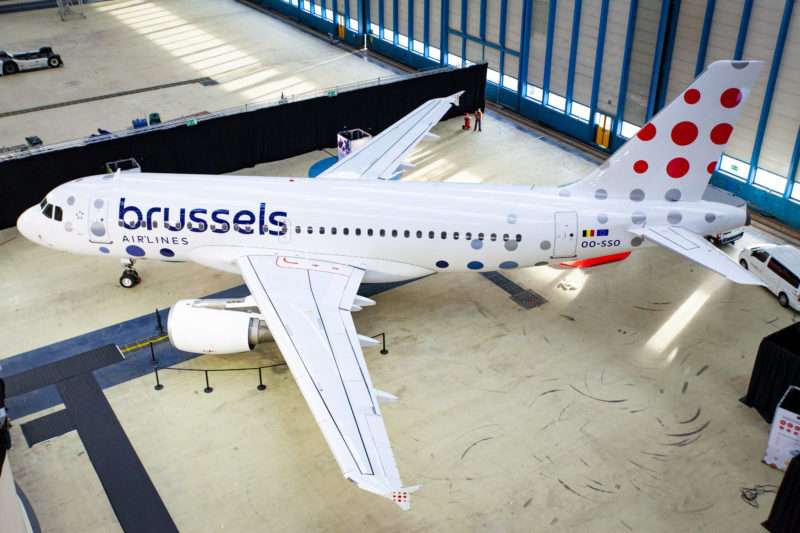Brussels Airlines kicked off the new year with a supply of Sustainable Air Fuel (SAF) being piped to Brussels Airport.

This will be delivered via the NATO pipeline (CEPS or Central Europe Pipeline System). Brussels Airport is the only Belgian airport that is fully connected to this pipeline network and had been asking for some time to be able to receive not only kerosene but also SAF via this pipeline.
Brussels Airlines will utilise Neste MY Sustainable Aviation Fuel. This will be produced from sustainably sourced, 100% renewable waste and residual raw materials, including used cooking oil and animal fat waste. Brussels Airlines purchased 2,000 barrels of 1,000 litres each with a blend of 38% SAF for this pilot project.
The sustainable aviation fuel was transported by Brussels Airlines from Neste’s blending facilities in Ghent via the CEPS pipeline to the fuel storage facility at Brussels Airport on January 1 just after midnight, allowing Brussels Airlines to operate its first flights with SAF on January 1, with a flight between Brussels and Malaga.
Peter Gerber, CEO of Brussels Airlines said:
“To achieve our climate goals, we will have to drastically increase the use of alternatives to fossil fuels in the coming years. Next to fleet renewal, sustainable aviation fuel is the most effective tool currently available to reduce emissions from air travel. Together with the Lufthansa Group, we have already invested in the production and use of SAF for several years. The fact that we can now transport the sustainable aviation fuel from the blending facility all the way to our aircraft at Brussels Airport in a fast and environmentally friendly way is an important step to increase the use of this type of fuel in the near future,”
Arnaud Feist, CEO of Brussels Airport added:
“This is an important milestone in making aviation more sustainable at Brussels Airport. Having sustainable aviation fuels available at the airport has been a priority for us and we are delighted that, thanks to NATO’s support, we can already achieve this at such short notice. As an airport, within the framework of our European Stargate program, we have expressed the ambition to aim for 5% SAF on total kerosene imports by 2026. That is faster than the European target, but we want to fully commit to this together with our airline partners. The fact that our home carrier Brussels Airlines is already taking the lead with a first order of SAF is a great start to realizing this ambition,”
Jonathan Wood, Vice President of Europe, Renewable Aviation at Neste concluded:
“Sustainable aviation fuel is the most effective tool currently available to reduce the emissions of air travel. Neste is working with partners like Brussels Airlines and the Lufthansa Group, airports and logistics providers to make SAF available across Europe and globally. Following permission by NATO to transport SAF on the CEPS pipeline system, we are proud to be the first to deliver SAF into the pipeline to Brussels airport. We look forward to using the largest pipeline system in Europe to supply other airports in the near future. Pipelines are the most efficient way to supply as Neste is scaling up SAF production capacity to 1.5 million tons annually in 2023,”
Ambitious targets, but supply will be key
Brussels Airport has an important part of the infrastructure part of the jigsaw already with the ability to secure delivery.
But we come back to the SAF supply question (one that has been raised on this blog more than once. According to Brussels Airlines
“In order to promote the collection of raw materials for SAF, a population survey and sensitization campaign will be used within the Stargate project to inform and sensitize the general public to collect more used frying oil for SAF production.”
That won’t solve the SAF size pond in a kerosene-sized ocean, with other sources going to be needed to optimise production.
In addition, facilities to blend the SAF/Kerosene will need to be developed. A large-scale plant was explored, but a smaller-scale one will now be considered.
As airlines work on the mixes of fuels, as well as how they intend to meet net-zero targets, securing supply will continue to be important – as well as how it is delivered.
The actual supply puzzle is one that Brussels Airlines, Lufthansa Group and everyone else will still be working on over the next few years.
Welcome to Economy Class and Beyond. Your no-nonsense guide to network news, honest reviews, featuring in-depth coverage, unique research, as well as the humour and madness I only know how to deliver.
Follow me on Twitter at @EconomyBeyond for the latest updates, as well as Mastodon too! You can follow me on Instagram too!
Also, remember that we are part of the BoardingArea community, bringing you the latest frequent flyer news from around the world.